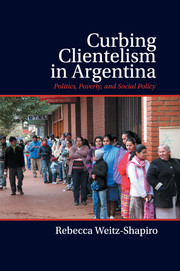Book contents
- Frontmatter
- Contents
- List of Illustrations
- List of Tables
- Acknowledgments
- 1 Accountability, Democracy, and the Study of Clientelism
- 2 Making Clientelism Work: Politician Behavior and Voter Beliefs
- 3 Curbing Clientelism: Why Some Politicians Opt Out
- 4 Clientelism, Social Policy, and Measurement
- 5 Clientelism across Municipalities in Argentina's National Food Security Program
- 6 Survey and Experimental Evidence for the Costs of Clientelism
- 7 Moving Toward Accountability? Comparative Perspectives and Policy Implications
- References
- Author Index
- Subject Index
5 - Clientelism across Municipalities in Argentina's National Food Security Program
Published online by Cambridge University Press: 05 October 2014
- Frontmatter
- Contents
- List of Illustrations
- List of Tables
- Acknowledgments
- 1 Accountability, Democracy, and the Study of Clientelism
- 2 Making Clientelism Work: Politician Behavior and Voter Beliefs
- 3 Curbing Clientelism: Why Some Politicians Opt Out
- 4 Clientelism, Social Policy, and Measurement
- 5 Clientelism across Municipalities in Argentina's National Food Security Program
- 6 Survey and Experimental Evidence for the Costs of Clientelism
- 7 Moving Toward Accountability? Comparative Perspectives and Policy Implications
- References
- Author Index
- Subject Index
Summary
As detailed in the previous chapter, perhaps the most significant challenge in testing any theory of clientelism lies in measuring it. In spite of clientelism's apparent reach and importance, the difficulty of collecting data on the phenomenon on any large scale means that we actually know very little about how widespread it is. In that chapter, I explained a new measure of clientelism that seeks to faithfully capture how an important government policy is implemented while also allowing for comparison across a substantial number of geographic units. Using an original elite survey of municipal bureaucrats across a large number of cities in Argentina, I assessed personalized mayoral intervention in the implementation of a large food program in that country. The simple cross-tabulations presented in the previous chapter showed, consistent with expectations, that the use of clientelism appears to diverge between high- and low-poverty municipalities when political competition is high. In contrast, where competition is low, mayors rely on clientelism at similar rates, regardless of constituent poverty.
In this chapter, I turn to a more complete test of the full theory, with its emphasis on the interaction between competition and poverty, as well as the role of partisanship, in shaping incumbent incentives for clientelism. The results of statistical analysis are consistent with theoretical expectations.
- Type
- Chapter
- Information
- Curbing Clientelism in ArgentinaPolitics, Poverty, and Social Policy, pp. 92 - 120Publisher: Cambridge University PressPrint publication year: 2014



